The GRITH consortium’s most recent meeting was hosted by our Belgian partners in Mechelen on 24th and 25th April. These dates combined well with the Climate Conference held in the same city location on 26th April where the GRITH project also presented and guided a work session. Altogether, it was 3 days of intensive knowledge exchange, site visits, workshops and networking.
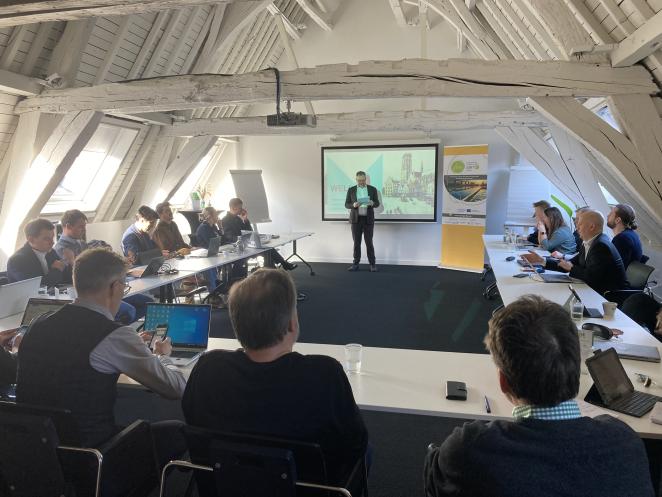
Alderman Princen welcomes the GRITH partners
Common ground, different challenges
Following a warm welcome by Alderman Patrick Princen at the city’s ‘House of Entrepreneurs’, project manager Hein Braaksma re-iterated the consortium’s common goal: to activate the potential of industrial sites and business parks as hubs in the energy transition. Or to use the project’s metaphor, wake up these ‘sleeping beauties. “We’ve made a great start with mapping the challenges that industrial sites face in our regions and see roughly two types of sites, “said Hein. “On the one hand large scale industrial sites, with a huge decarbonization task, but also great challenges in terms of organization and ownership to make this possible. On the other hand, we shave business parks, where the decarbonization task seems smaller, but the organizational challenge is larger.”
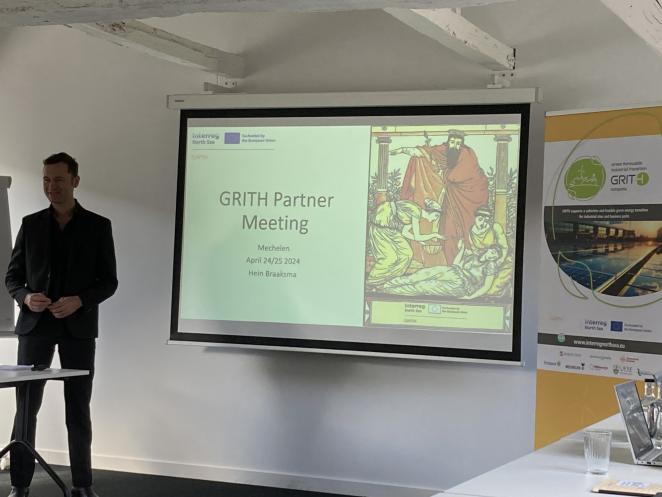
Hein Braaksma, PM Mechelen
Pooling knowledge
GRITH continues to create strong alliances by discussing developments and organizing stakeholder events to introduce plans and share progress. Hydrogen and the related infrastructure are also becoming an increasingly important part of the potential energy mix on several sites.
During the meeting, partners shared many ingredients within the various work packages that contribute to this joint approach, creating a knowledge pool knowledge to develop an Energy SWOT, for example. The group also deliberated on the definition of ‘energy hub’ and which factors should be included, for example:
- Finding a method to relieve net congestion
- Bringing demand and supply together
- Exchanging heat with members
- Forming a crossroad with different energy sources
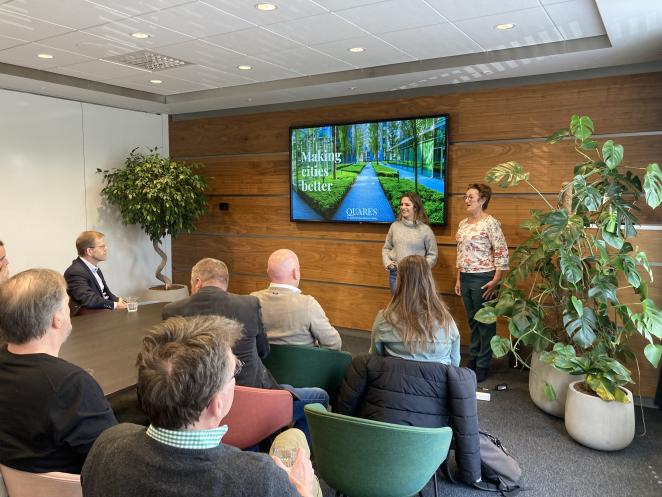
Energy hubs & communities
Every partner meeting incorporates site visits in the programme. In Mechelen, participants visited, amongst others, the Mechelen Noord business park where the site manager from Quares started the development of an energy hub, moving from theory to practice with building blocks for energy communities. Quares has also added e-mobility to the energy hub mix. The triple helix (universities, municipalities and companies) can assist with the challenges being faced and the municipalities can bring the different parties together.
In practice, companies are currently dealing with countless issues already and many do not have the internal knowledge, experience or manpower to focus on the energy transition. Searching for a suitable support mechanism, the consortium discussed the potential value of using the Corporate Sustainability Reporting Directive (CSRD) for example, as an incentive for engaging with stakeholders.
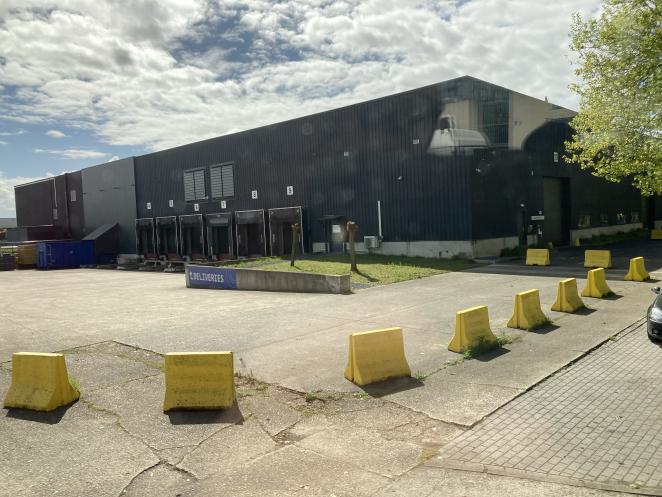
Comparing policies
Discussions also landed on the topic of policy, in particular the differences between local, national and EU strategies and policies, state aid schemes, focus and perspectives. Subsidies can relate to energy prices or decarbonization, for example. Contradicting EU policy on various levels, and differing strategies per county leads to confusion and further complexities on industrial sites. Energy prices and carbon intensity are the incentive at the moment. GRITH has planned a new survey to help unravel these issues, map the available assistance and guide business sites through the labyrinth of EU, national and regional regulations.
There was also sufficient time in reserved in the 2-day programme for a number of inspirational presentations – all feeding the GRITH knowledge base. Pôlénergie introduced the Reuze project which aims to convert more than 300,000 tons of CO₂ into more than 100,000 tons of electro fuels and naphtha per year.
Vejle Municipality shared their experience with stakeholder engagement and finding the right drivers to encourage companies to cooperate within an energy hub. Technical knowledge is a necessity and essential for the next steps.
Meanwhile, Mechelen is elaborating on their local heat strategy. Due to the city’s participation in GRITH, their policy plan is now a masterplan with more details and defined principles. A strong strategic basis has been formed by integrating the City’s ambitions with those of local businesses.
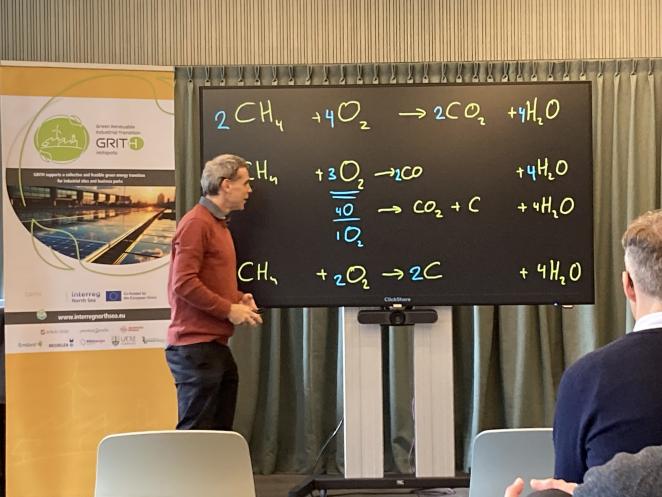
Frederik Loeckx presents Flux50
FLUX50
Frederik Loeckx was invited to present FLUX50, a Flemish membership organization. FLUX50 gained international recognition for Flanders as a Smart Energy Region. Flux50 facilitates cross-sector collaboration between energy, IT and building companies to enhance the competitiveness of the Flemish smart energy industry in the transition towards low carbon systems. Legislation and permits are a hurdle because they take a lot of time,” said Frederik. “What we need is coordination, positive business cases, collective, local energy market, low administration and broad support.”
Legislation and permits are a hurdle - they take a lot of time.
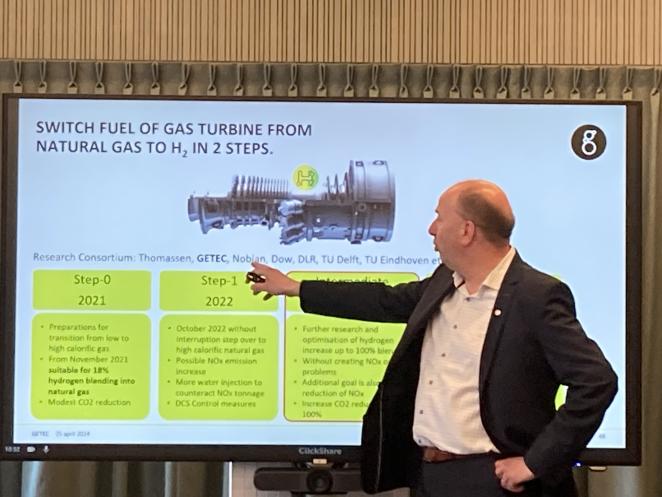
René Hartman, Head of Industry at GETEC Benelux
GETEC
Another inspiring guest speaker was René Hartman, Head of Industry at GETEC Benelux. The GETEC group has four platforms in Europe, one of which is in the municipality of Emmen (NL) – a partner in GRITH. Here GETEC supports companies in industry and the real estate sector on their way to climate neutrality, offering a wide range of climate-friendly and smart energy solutions. These include tailor-made contract concepts, technical know-how, regulatory competence and proven expertise in the field of sustainability and carbon reduction.
GETEC owns the energy infrastructure on the parks. The closed distribution system can be used as an instrument in overcoming net congestion. As part of the focus on energy transition GETEC works on green steam, powered by bio coal, and experiments with hydrogen. The business case for this transition is not always positive, but end-users expect greener products from GETEC clients. The necessary certificates for green production and greener fuels can be challenging. Regulations are proving to be a challenge in different parts of the energy transition. In some cases there’s too much policy, in others there’s not enough.
Sharing more best practices and knowledge is essential. Five of our latest learnings in Mechelen:
- GETEC’s hydrogen pilot, green steam based on bio coal and their role in developing a local energy community.
- Terbekehof Antwerpen - the first energy community on an industrial site in Flanders.
- Mechelen Noord - where Quares organizes cooperation and offers energy management and optimalisation.
- Energy brokerage – seeing different perspectives. Not just redesign of existing businesses, but also the potential for new business as part of the energy transition. The Reuze project is a good example of this.
- Site visits to E-mobility hub Keerdok, Quares, Aquafin and Otterbeek

Grith partners visit Mechelen, April 2024
What’s next?
Efficiency is on our agenda for the following months. As recent theme-related online exchange sessions have proven very successful, more now being planned. On 3rd of June GRITH will hold a session on revolving funds, dealing with: technical solutions for business parks, Just Transition Fund, EU legislation and national funding opportunities.
Other workshop topics being discussed include IT Solutions, E-mobility, Data Centres and additional large scale energy consumers
With each meetingthe GRITH consortium grows stronger as we benefit more and more from the close cooperation to achieve joint ambitions. We are grateful to our partners in Mechelen for hosting this valuable exchange, offering fine examples of the Flemish approach and an insight into what is happening in their region.
